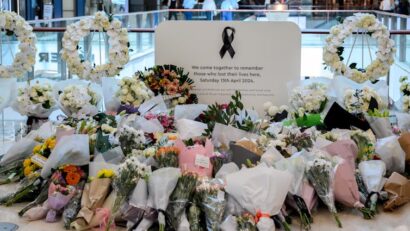
National Cabinet has committed to a range of strategies to stop violence against women, but has it done enough?
Violence against women is not a women’s problem to solve, it is a whole of society problem to solve; and men in particular have to take responsibility.
Those were the words of Prime Minister Anthony Albanese as he reported on the outcomes of today’s National Cabinet meeting on gender-based violence.
This is a crucial moment.
It’s not the first time Australian government leaders and senior officials have met to discuss strategies to address violence against women. But it’s the first time the National Cabinet has met specifically to commit to greater action. Seen in recent protest marches across the country, there’s a lot of public demand for rapid change.
Out of today’s meeting there is a renewed commitment for “national unity”, across all governments, towards the shared mission to end gender-based violence.
We know why this mission continues to be urgent.
At least 28 women have died, allegedly at the hands of men’s violence, so far this year. And many more women are living with the harms of men’s violence all across the country.
One in four women have experienced violence by an intimate partner or family member since the age of 15. One in five women have experienced sexual violence and one in five women have experienced stalking. While we seem to be making progress in reducing 12 month prevalence rates of intimate partner violence, our Personal Safety Survey also indicates the rates of sexual violence and stalking have not been changing. It’s clear we need more action.
What came out of National Cabinet?
The biggest announcement from today’s meeting is a new federal government investment of A$925 million over five years to permanently establish the Leaving Violence Program. This is to be included in the upcoming budget and builds on the existing pilot scheme. The scheme delivers up to $5,000 in crisis support for women leaving violent relationships, as well as risk assessments and access to support services.
There was also a big focus on online measures to combat online harms and to reduce the exposure of children and young people to violent and misogynistic content. This included commitments to new laws banning sexualised “deepfake” images, as well as a review of classifications to reduce exposure to violent sexualised content. And $6.5 million will be committed to pilot age assurance technologies to restrict children’s exposure to inappropriate content, including violent pornographic material.
Read more:
Whether of politicians, pop stars or teenage girls, sexualised deepfakes are on the rise. They hold a mirror to our sexist world
The government will also bring forward a review of the Online Safety Act and fast-track already proposed anti-doxing laws. The aim of these steps is to protect victims from online harms, including the non-consensual disclosure of their personal information.
The prime minister also highlighted several existing federal government commitments. These included the funding commitments to women’s homelessness and housing services and funding increases for the eSafety Commissioner. Also mentioned was the next phase of the national Stop It At the Start campaign, which is due to be released mid-year and will focus on how to have preventative conversations with young people around their attitudes and behaviours.
Importantly, there is an agreement for National Cabinet to meet again on violence against women next quarter and to report back on progress made and crucial next steps. The states and territories also agreed to collaborate and share their own best-practice evidence and initiatives.
Prime Minister Anthony Albanese called the snap meeting of National Cabinet.
Gaye Gerard/AAP
What further changes might be on the horizon?
To end gender-based violence we need to do everything we can. We need a range of short, medium and long-term actions. The outcomes of the National Cabinet meeting today indicated some further areas earmarked for ongoing discussion.
There were suggestions of the need for greater harmonisation of laws between states and territories. This is vital if we are to ensure women have equal protections and justice mechanisms in place no matter where in Australia they live. What was not mentioned, however, was the need for adequate resourcing of specialist police, legal and court services to support access to justice for victims of family and sexual violence.
There was also mention of improved information sharing between states and territories to promote greater accountability for repeat violent perpetrators. This is not a straight-forward area, but there are good examples of coordinated system responses that show when and how the sharing of information might be vital for women’s safety.
Workforce issues were also referred to, with an urging for a more rapid rollout of the federal government’s existing commitment of 500 extra domestic and family violence support workers. If you speak with these support services, it is clear they are under high demand from victim-survivors. There are often unacceptable wait lists. The extra workers are much needed, but it will also take accessible and affordable training to extend this specialist workforce.
Albanese also highlighted both the effectiveness of respectful relationships education in schools and the need for a national approach to respectful relationships education across the country. To date, both Victoria and Queensland have led the way in this work but certainly we need to scale-up our prevention efforts with young people if we want to end gender-based violence for the next generation.
Delivering on the National Plan
The National Plan to End Violence Against Women and Children (2022 to 2032) and its first action plans already identify a shared roadmap across prevention, early intervention, response, and recovery. Each of these four priority areas are crucial to a holistic strategy to end gender-based violence.
And for the first time, we have a stand-alone Aboriginal and Torres Strait Islander action plan with an already-announced federal government commitment for a National Plan for First Nations women. This is especially vital in light of the over-representation of First Nations women experiencing violence.
Delivering on these strategies must continue to be a priority. The National Plan has been developed over many years of research evidence, consultation, as well as both sector and lived-experience expertise. And it is arguably world-leading in its comprehensive approach.
But as Micaela Cronin, Australia’s first Domestic, Family and Sexual Violence Commissioner, remarked today:
No plan in such a complex area can be a “set and forget plan”.
It’s vital we draw on evidence-based approaches and best practice as we continue to refine our actions to address and prevent gender-based violence. This includes addressing the gender inequality and intersecting inequalities that drive violence against women. And also directly addressing the reinforcing factors that can contribute to violence and its escalation, such as prior experiences of violence, drug and alcohol misuse, problem gambling and poverty.
There is also a pressing need for governments to continue to work collaboratively to coordinate action and adequate investment across all levels of government. This is not the time to play politics between parties.
No Australian government has yet solved this problem. Every Australian government can and should do more to advance women’s safety.
Perhaps the most important outcome from today’s National Cabinet meeting is not just a renewed national commitment on action to end gender-based violence, but an Australia that will hold all governments to account on delivering their promises.
The National Sexual Assault, Family and Domestic Violence Counselling Line – 1800 RESPECT (1800 737 732) – is available 24 hours a day, seven days a week for any Australian who has experienced, or is at risk of, family and domestic violence and/or sexual assault. Läs mer…
